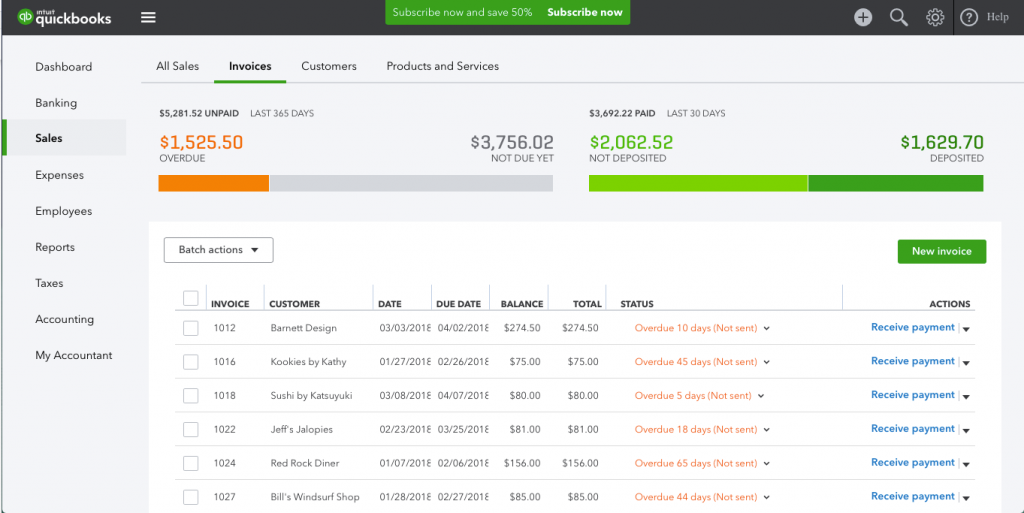Did you know that, according to Sage, 86% of accountants believed that they would welcome automating technology that would make the administrative aspects of their jobs invisible, thereby allowing them to focus more on their customers and growing their business? Furthermore, a whopping 99% of U.S. accountants also voiced confidence that technology had a positive role to play in the management of their company’s accounts.
In this blog, therefore, we will be doing a Zoho Books vs QuickBooks 2023 comparison to see which of the two market-leading software is the best fit for your business. And in doing so, we will be proving how both software are robust, yet Zoho Books, because of its reduced pricing and relatively fewer features, is more suited to small businesses and startups that do not have deep pockets whereas QuickBooks, with its relatively more advanced suite of features that comes with a higher price tag, is geared for more established businesses that will not only be utilizing these features but will also be able to afford to continually pay the higher price.
What is Zoho Books?
Zoho Books is an online accounting software created by Zoho Corporation, a well-known software firm that provides a suite of cloud-based business solutions. Zoho Books was created to help small and medium-sized enterprises simplify and expedite accounting and financial management activities. It offers a complete collection of tools for dealing with many facets of financial management, making it an invaluable tool for business owners, accountants, and finance experts.
What is QuickBooks?
QuickBooks is a well-known accounting software produced by Intuit that is specially tailored to the demands of small and medium-sized enterprises. It is well-known for its user-friendly design, sophisticated features, and robust financial management skills. QuickBooks is available in both online and desktop versions, allowing businesses to select the solution that best meets their needs.
Zoho Books vs QuickBooks 2023: A Detailed Comparison
-
Key Features:
Zoho Books: Zoho Books’s key functions include invoicing, expenditure tracking, bank reconciliation, inventory management, and financial reporting. It also offers periodic transaction automation and customizable workflows to help improve accounting procedures.
QuickBooks: QuickBooks is well-known for its broad capabilities, including invoicing, expense tracking, bank reconciliation, and project accounting. It also includes additional features such as class and location tracking, time tracking, and multi-currency compatibility.
The verdict: Both software offer more or less similar features. However, Quickbook’s inclusion of its additional features of class and location tracking renders it more suitable for larger businesses that, on top of calculating the company’s total profit, will also be interested in identifying and then analyzing the performance of their business’ individual components.
-
Pricing:
Zoho Books: Zoho Books has tiered pricing options that range from a basic plan for small businesses to more comprehensive plans for bigger businesses. Pricing is reasonable and based primarily on the number of users and features necessary. The following is the list of Zoho Books’ pricing plans on a monthly basis:
- Free—$0 (For businesses with revenue <50K USD per annum)
- Standard—$10 (Per Organization/Month Billed Annually)
- Professional—$20 (Per Organization/Month Billed Annually)
- Premium—$30 (Per Organization/Month Billed Annually)
- Elite—$100 (Per Organization/Month Billed Annually)
- Ultimate—$200 (Per Organization/Month Billed Annually)
QuickBooks: QuickBooks, on the other hand, has only 3 pricing plans (all of which are paid). Again, like Zoho Books, QuickBooks’ pricing plans also differ from one another based on the number of users and the range of features offered. The following is the list of QuickBooks’ pricing plans on a monthly basis:
- Simple start—$18
- Essentials—$27
- Plus—$38
The verdict: In pricing, Zoho Books offers the most dynamic pricing. It not only offers a completely free version for first-time and/or light users to make use of, but it also offers a variance of differently priced tiers that budget-conscious users who want to get the most use of their subscription to Zoho Books can use to their advantage.
-
User Interface:
Zoho Books: With a straightforward and user-friendly design, Zoho Books is suitable for users with varied degrees of accounting competence. Its simple design and simplicity of use contribute to a pleasant user experience. The following are a few select images of Zoho Books’ easy-to-use user interface:
QuickBooks: QuickBooks is also well-known for its user-friendly layout and straightforward navigation. It has a simple onboarding procedure that allows new users to get up and running fast. The following are a few select images of QuickBooks’ easy-to-use user interface:
The verdict: Both software offer an easy-to-use interface, so there is not much to be discussed here.
-
Integrations:
Zoho Books: Zoho Books connects easily with other Zoho products, including Zoho CRM and Zoho Inventory, to gel your business’s tech stack within a single ecosystem. It also has connections with major third-party programs, which improves its functionality.
QuickBooks: QuickBooks offers a large marketplace of connectors that link with a variety of third-party apps, payment gateways, and industry-specific software. Its vast integrations meet a wide range of business requirements.
The verdict: Although both software’s costliest tiers do offer similar levels of integrations, the fact that QuickBooks offers more integrations in a drastically reduced price range automatically gives it the edge. Zoho Books offers noticeably fewer integrations at the same price as QuickBooks, so, unless budget constraints are an issue, you should definitely go for QuickBooks to streamline the finances of your business.
The final verdict:
Zoho Books is appropriate for small and medium-sized businesses due to its low cost and crucial financial management capabilities. Despite its greater price, QuickBooks is suitable for bigger organizations because of its extensive features and a wide variety of connectors. The decision between the two is determined by unique business needs, size, and money. In 2023, a thorough examination of essential features, price, user interface, and connectors will assist businesses in optimizing their accounting and financial management when deciding who to support in this showdown between QuickBooks Online vs Zoho Books.






